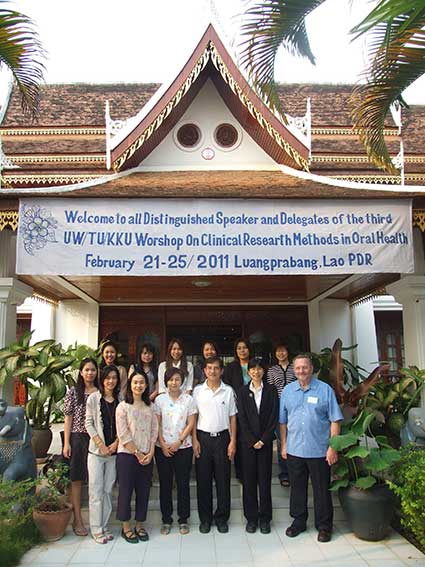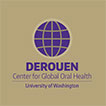Since 2006, there has been a dedicated effort to expand oral research capacity in Thailand. In conjunction with the University of Washington and Dr. Timothy DeRouen, two National Institutes of Health Fogarty International Center (FIC) D43 grants have been awarded, which funds research capacity building. From this initial research infrastructure, many Thai and southeast Asian researchers have been trained in global oral health research techniques. The first grant targeted research capacity building at Khon Kaen and Thammasat universities in Thailand, and the second grant expanded to invite researchers from surrounding SE Asian countries such as Vietnam and Cambodia to study oral health research in Thailand.
 To build research capacity, they structured a three-tier training program. The first tier was a five-day workshop in Thailand which has trained over 100 participants, a second tier was attending the Summer Institute held at University of Washington in Seattle and trained over 30 participants, and the third tier was completing a PhD program in Thailand and trained approximately 10 participants. Since the inception of this research expansion program, hundreds of researchers in Thailand and surrounding countries have been trained in research methodologies such as epidemiology and biostatistics.
To build research capacity, they structured a three-tier training program. The first tier was a five-day workshop in Thailand which has trained over 100 participants, a second tier was attending the Summer Institute held at University of Washington in Seattle and trained over 30 participants, and the third tier was completing a PhD program in Thailand and trained approximately 10 participants. Since the inception of this research expansion program, hundreds of researchers in Thailand and surrounding countries have been trained in research methodologies such as epidemiology and biostatistics.
After the first awarded National Institutes of Health D43 grants which built initial research capacity in Thailand, the original trainees are now capable of taking the leading role as trainers and offering the trainings to other low- and middle-income countries in the region. To expand training capacity further, Dr. Waranuch Pitiphat from Khon Kaen University, applied for and was awarded an NIH D71 grant with the Health Fogarty International Center (FIC). The D71 grant is a 1-year grant which funds the planning of a training program and is a precursor to the 5-year D43 training grant.
This new planning grant was awarded and explored ways to increase training capacity in SE Asia. The grants aims were to assess the need for and structure of the advanced oral health research training programs in the region, to strengthen research training capacity of the host institutions through faculty trainings in mentorship, online course development and evaluation, and short-term training course development and evaluation; and to create a network of collaborating institutions in SE Asia for the future training grant. To fulfill the aims they conducted several activities, including convening a meeting of SE Asian dental school Deans and Associate Deans from 16 cities in 8 countries to establish a network of collaborators and assess the oral health research trainings needs in the region, training mentors, online course development and workshop, short-term research training workshop for trainees, and developing a grant application for a future D43 FIC research training grant.
The D71 planning grant was successful, establishing a cohort of institutions within SE Asia that will are interested in expanding research capacity, and will collaborate on future research endeavors. Based on these findings, a new D43 application to further expand research capacity in SE Asia has been submitted to NIH. Data from increased research training was collected based on this and previous research training grants in Thailand and other developing countries, and published in the Annals of Global Health in November 2020, entitled “Mitigating global oral health inequalities: Research training programs in low- and middle-income countries.”
